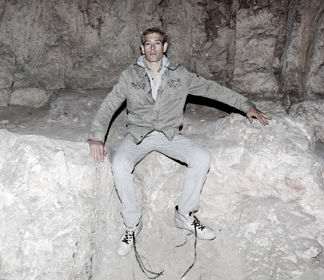The Core: Matisyahu

Photo by Mark Squires
Initial Spark
When we first started Spark Seeker, I was writing with different people – initially, I was going to write an album with [my live band] The Dub Trio and it was going to be more of a rock-based record. Then, I got in the studio with Kojak [aka Allan Grigg] just to write. Along with Dub Trio’s [Dave] “D.P.” Holmes, we came up with “Sunshine.” It was a fun studio environment, so Kojak and I did it again. Eventually, we had seven songs and then Kojak wanted to go to Israel. I’ve never actually recorded in Israel, but I have all these friends there who are amazing musicians. We recorded in Tel Aviv with live instrumentation, which is different than so much of the record with just a producer. We got all this material – guys jamming over different stuff – and then, finally, I moved to LA and finished the album. My wife wanted us to move, really. They moved our stuff out when I was on tour last summer and I came home in September to a new place. She wanted to try it out. It’s alright. It’s no New York but…
Live Dynamics
Spark Seeker became Kojak and me’s project. At some point, it would be cool to work on a joint record with The Dub Trio. The thing with The Dub Trio is that the live drums are such a big part of the sound, and when you’re working with a producer who is programming beats, it’s hard to find room for both. I think the dynamics of our live show are going to continue to grow, in the sense that there are definitely going to be moments that are going to be more hard-hitting like the record. But, as we’ve gotten a feel for each other, our improvisational moments have also grown. Those moments are going on for a longer period and the show starts to be dynamic as opposed to just being dubbed-out the whole time.
Handing Over the Reins
I tend to lean in the direction of whichever producer I’m working with – their flavor and expertise. If our musical tastes don’t line up, I won’t typically work with that person. David Kahne, on Light, comes from a singer/songwriter background. He’s more into the vocals, the sensitivity of the vocal melodies and the layering. The reason I worked with Bill Laswell on Youth was because I grew up listening to that dub record of Bob Marley[‘s music] Dreams of Freedom. On Shake Off the Dust, we went in to make a roots-reggae record and tried to emulate that sound. With Kojak, his expertise is more pop and hip-hop, which is great because it gives me the opportunity to jump into those shoes. I grew up listening to hip-hop in the ‘90s – that’s a big influence for me.
Personal Journeys
My whole journey with Judaism has been in waves – it’s been a living, breathing thing. It’s gone through different phases. It started when I went to Israel for the first time when I was 16. I remember when, musically speaking, I started writing rhymes where I was using a lot of imagery from Hasidim and Judaism, similar to Rastafarian imagery of the Star of David. I started to delve into it through music, and through reggae music – then living in Crown Heights and [with] Yeshiva and being embedded in that world, through teachers and different people, that I committed myself to it along the way. I’ve had different phases and explored different types of Hasidim and outlooks – Kabbalah and the mysticism – and I’ve delved into Judaism full-force. I’ve gotten such a good sense of the people, the circles, the way the ideas translate in the world, the ups and the downs, the identity and the whole thing. In December, I felt…I was ready to…move in a new direction, to move beyond it and try living in another way. I’m exploring different modes and ideas all the time, but they’re not always showing on my face. It’s been my trip. My kids are affected by [my decision to shave my beard] and my wife is affected also – it was not a family decision.
Identity Theft
[When you’re a famous musician], you’re sharing your life with a lot of people. A lot of people – especially in my circles – took some ownership over who I am and my identity and all that. So anytime I make a change, [they get upset], and it seems like I go through this every time. Even [with] every record I put out, there are always fans that are like, “Well, the sound has changed.” I guess people – at some point – will get it.




















